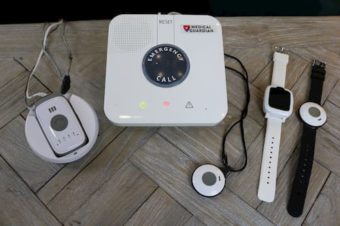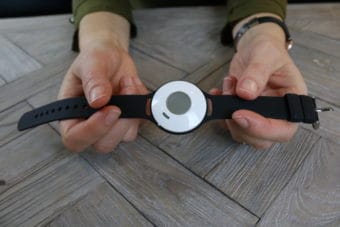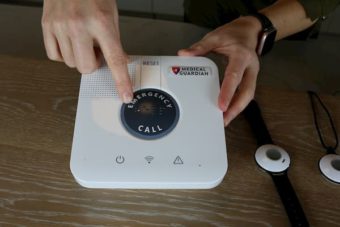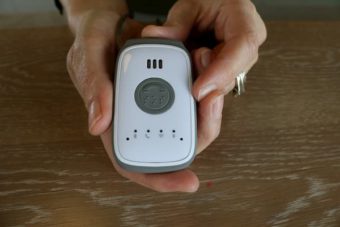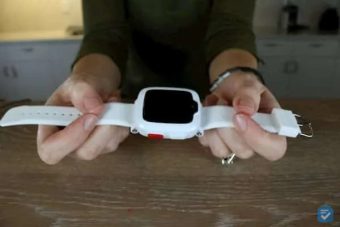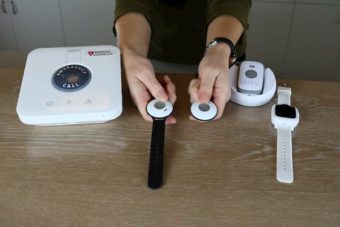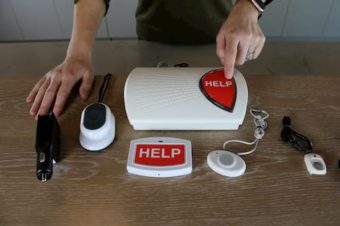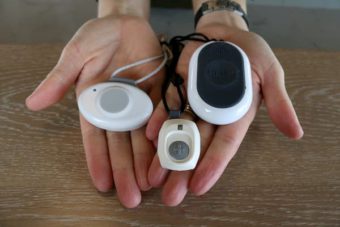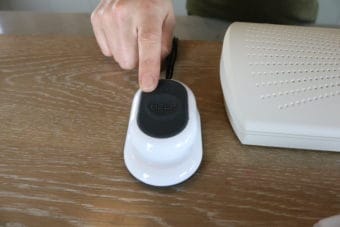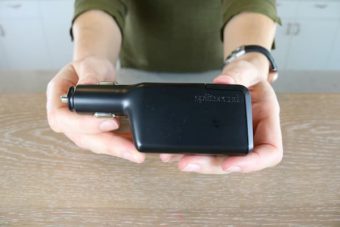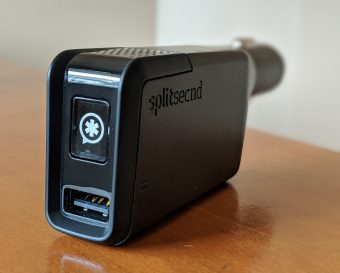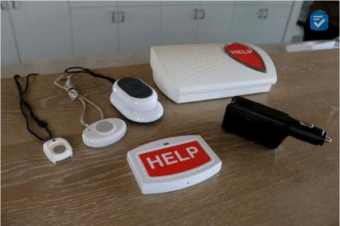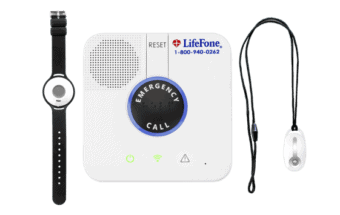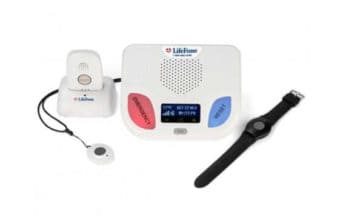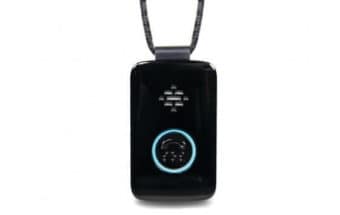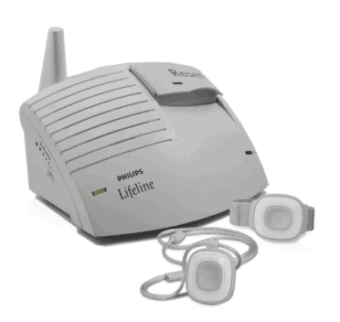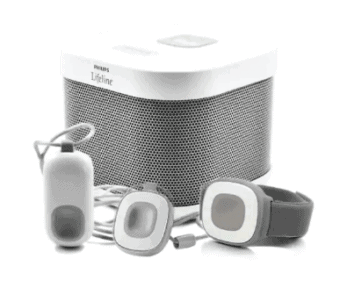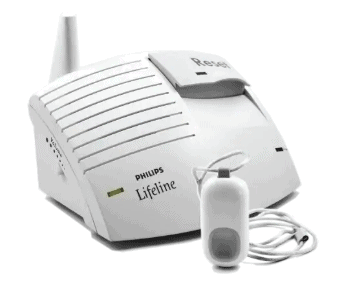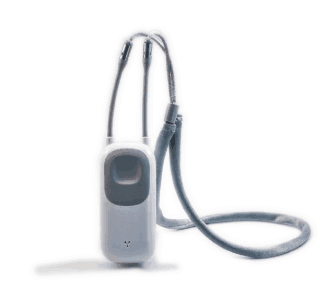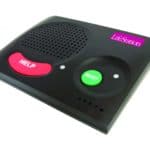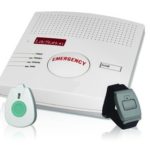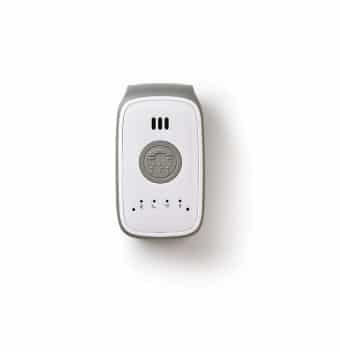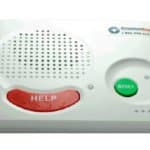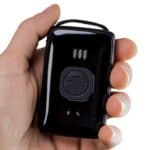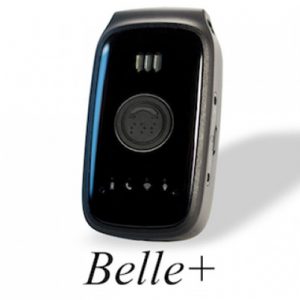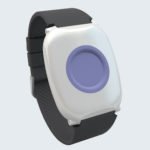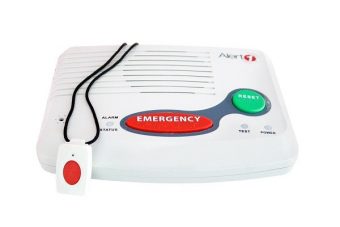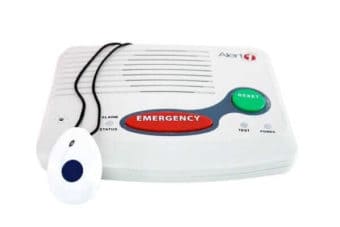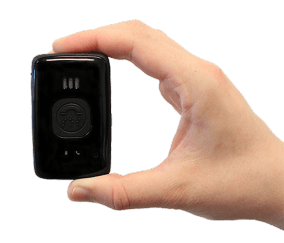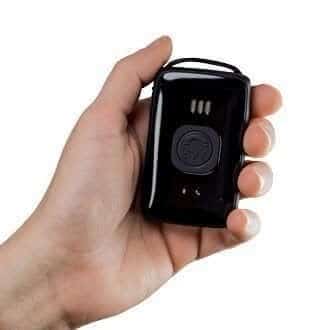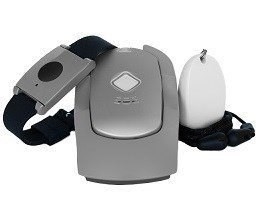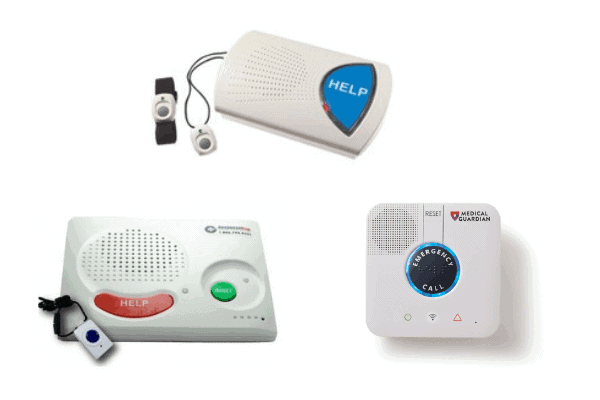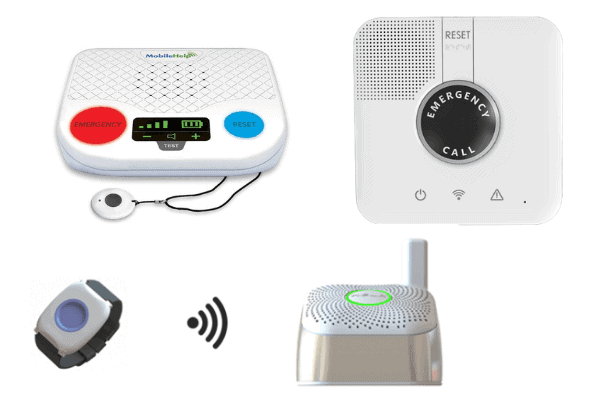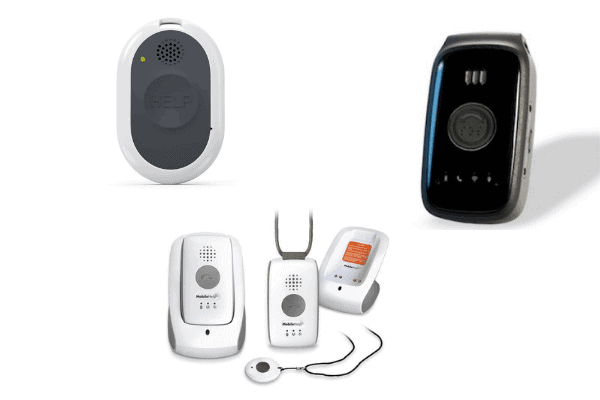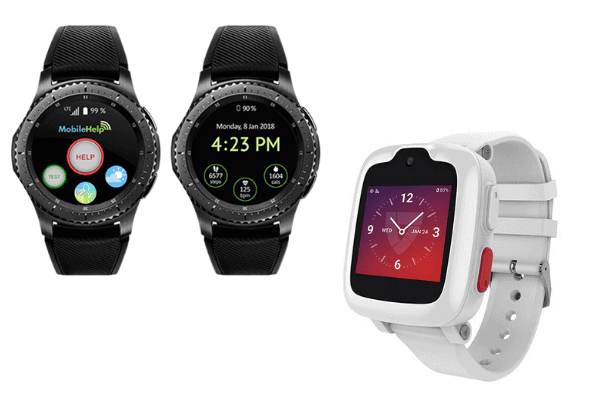*Our Best Medical Alert Systems 2025
What is a Medical Alert System?
Medical Alert Systems are life-saving devices that connect a user with help when a button is pressed, or in some cases, when a fall is detected. There are a large number of medical alert companies in the U.S., and they can vary widely in terms of equipment quality and services offered. With seemingly endless options to choose from, it’s difficult to know where to start. Rest assured, you’re in good hands. Our team of experts leave no stone unturned when testing and reviewing medical alert systems.
Our Highly-Anticipated Annual Lineup of the Best Medical Alert Systems for 2025.
Emergencies happen. That’s why a medical alert system is a life-saving investment for any senior. The ability to call and receive help at the touch of a button gives seniors and their loved ones the reassurance and peace of mind they deserve. But how do you know which one is best?
Simply narrowing down your choices can be a daunting task. That’s why every year over 250,000 people visit The Senior List for trusted advice and information on the best medical alert systems on the market today. We believe the alert systems on this list deliver the highest overall value to customers. And we think you’ll agree.
We Hold Medical Alert Systems to the Highest Standards
Medical alert systems must meet the following four criteria to qualify for our Recommended list:
-
Equipment works as advertised, or better
Most medical alert equipment on the market today is just “good enough.” But our readers deserve better than “good enough.” To make our list, medical alert equipment must perform to a high standard.
-
Great customer service
We look for customer service teams who answer calls in a timely manner, and who are courteous and knowledgeable enough to answer your questions.
-
Affordable pricing
Most medical alert systems range from $20 – $40 per month for traditional in-home systems, and a little more for cellular capabilities. All of the systems on our list fit this price bracket.
-
Easy to cancel contracts
If you frequent The Senior List, you know we’re very much against long-term contracts. Some companies lock customers into 3 year contracts, which means you’re stuck paying if your loved one no longer needs it. All of the companies on our recommended list offer easy cancelation terms with NO long-term contracts.
Ready to choose from a list of the best medical alert systems on the market today? Have a look at our highly-anticipated 2025 lineup.
Additional Medical Alert System Lists
Keeping loved ones safe is a priority for us all. We hope this list makes it easer to choose the right medical alert system for your lifestyle and budget. You can also take a look at some of our other best medical alert system lists for those who are looking to fulfill a particular need:
The 12 Best Medical Alert Systems
- Medical Guardian : Best Overall Value
- Bay Alarm Medical : Most Affordable
- Aloe Care Health : Best Caregiver Features
- LifeFone : Free Spouse Coverage
- Medical Alert : Best Mobile App
- GetSafe : No Button Necessary
- Lifeline : Easiest to Use
- Lively Mobile2 : Fast Call Response Time
- LifeStation : Low Monthly Fees
- ResponseNow : Best Battery Life
- QMedic : Smartest Medical Alert System
- Alert1 : Best Cellular Coverage
|
Our Rank |
Medical Alert Company |
Starting At |
Fall Detection |
In Home Range |
Cellular Provider |
|---|---|---|---|---|---|
| 1 |  |
$27.45 | $10/mo | 1300ft | AT&T or Verizon |
| 2 | 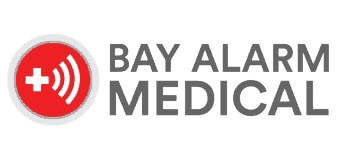 |
$24.95 | $10/mo | 1000ft | AT&T 4G LTE |
| 3 |  |
$29.99 | $10/mo | N/A | AT&T |
| 4 |  |
$29.95 | $5/mo | 1300ft | AT&T |
| 5 |  |
$19.95 | $10/mo | 400ft | AT&T |
| 6 |  |
$25.00 | $10/mo | 1300ft | AT&T |
| 7 |  |
$29.95 | $15/mo | 400ft | AT&T |
| 8 |  |
$24.99 | $15/mo | N/A | Verizon |
| 9 | $19.95 | $7/mo | 500ft | AT&T | |
| 10 |  |
$29.95 | $11.95/mo | 600ft | AT&T |
| 11 |  |
$30.00 | N/A | 1000ft | AT&T |
| 12 |  |
$16.95 | $11/mo | 600ft | AT&T / T-Mobile |
*Cellular units do not require wifi or an internet connection. There are no additional cellular contracts required for cellular units.
For additional details about these top rated companies, continue reading!
Our Full List of the Best Medical Alert Systems for 2025
1. Medical Guardian - Best Overall Value
What We Like Most:
- No long-term contracts
- Quick response times
- Fall detection available
- 24/7 U.S. based monitoring
Overview
Over the last decade, Medical Guardian has served its users across the U.S. with a fierce commitment to customer satisfaction and saving lives. The company has earned numerous awards including “Top Workplaces,” “Best Places to Work,” and most recently, “National Winner for The Best and Brightest Companies to Work For.” The vibrant work culture at Medical Guardian translates to happy employees who are dedicated to helping seniors.
Medical Guardian offers an in-home traditional medical alert system, an in-home cellular option, two mobile + GPS devices, a smartwatch, and fall detection.
Medical Guardian is perfect for active seniors who want to remain safe without being tethered to their home. The MGClassic is a great option for those with larger homes.
Medical Guardian is also a great choice for those who are often on-the-go outside the home with the long-lasting Active Guardian and the “invisible” medical alert of the Freedom Guardian.
Medical Guardian provides top-notch medical alert equipment in addition to their stellar service. They offer traditional and cellular in-home options, two mobile + GPS units, an all-inclusive family monitoring plan, and an innovative smartwatch for both men and women. Read the Medical Guardian review here to learn more about their offering.
Medical Guardian Details:
Features: Landline and cellular In-home options, mobile option, new combination Wi-Fi and cellular system for more active users, water-resistant button.
Extras: Automatic fall detection.
Battery: 32-hour backup battery on the at-home system, and 24-hour battery life on the mobile system.
In-home range: 1,300 ft on MGClassic, a traditional at-home system. Although a landline is required, this is one of the longest ranges on the in-home market today!
Cost: Starts at $29.95 monthly.
Why we chose them: Medical Guardian offers a flexible range of units and pricing plans, and their customer service is second-to-none.
What makes them stand out: The 1,300 ft range on the home unit is the highest range we’ve seen. And their new combined Wi-Fi and the cellular unit is unique in that it’s the only such option on the market today.
Medical Alert Systems Offered:
MGClassic — Traditional in-home medical alert system that plugs into a landline. With a range of up to 1,300 ft., this is the most robust in-home system to date.
Home Guardian — Cellular in-home medical alert system that works without a landline.
Family Guardian — The most advanced in-home system combining a cellular alert system with activity monitoring and a smartphone app for family and caregivers.
Mobile Guardian — Mobile + GPS medical alert that runs off of the AT&T network. Has a 24-hour battery life and a clear two-way speaker to connect with a monitoring center in the event of an emergency.
Active Guardian — Mobile + GPS + WiFi location technology + fall detection. This medical alert system does it all. It includes a 5-day battery life, precise location technology, clear two-way speaker, and it’s waterproof.
Freedom Guardian — An innovative alert system that combines medical alert technology in a feature-rich smartwatch that doesn’t require a cell phone to operate. With black or white color options, the Freedom Guardian is great for men or women who want to wear a medical alert system discreetly.
How Much Does Medical Guardian Cost?
The alert systems from Medical Guardian range from $29.95-$79.95/month.
What users are saying:
“Their people went out of their way to explain their services. Unlike many of the other companies they did not try to sell me more than I needed and their overall pricing was better than the rest that I talked to.”
“I’d recommend Medical Guardian to anybody.”
“Dealing with their team has been pleasant and easy. It’s a good experience and I would recommend it.”
What the company says: “Here at Medical Guardian, there’s nothing we love more than hearing, ‘My medical alert device saved my life,’ because that’s what we do. We’re not just selling emergency response systems; we’re saving lives, every single day.”
Pros
- All-in-one mobile system
- Landline and cellular options
- Smartwatch option
- Accurate location tracking
- Fall detection available on most systems
- No long-term contracts
- Free month of service on annual subscriptions
- Up to seven-day mobile battery life
Cons
- Occasional false alarms with fall detection
- Limited activity monitoring
Medical Guardian is passionate about giving seniors the freedom to remain in their homes and live life without limits. They offer a variety of options for both in-home and mobile medical alerts to accommodate any level of activity and lifestyle. And with the recent addition of the Freedom Guardian, a wearable medical alert watch, aging adults are protected anywhere they go. Medical Guardian offers easy to understand, customer-friendly terms. And there are no long-term contracts.
2. Bay Alarm Medical - Most Affordable
What We Like Most:
- 30-day risk-free trial
- Optional fall detection
- Location tracking on mobile units
- Systems starting at $19.95 per month
Overview
Bay Alarm Medical is a long-standing, family-run company that has been around since 1946. Bay Alarm Medical prides itself on outstanding customer service, and it shows in their numerous online positive reviews and customer testimonials.
Bay Alarm Medical offers a traditional in-home medical alert system, a cellular in-home system (no landline needed), and a 4G LTE + GPS mobile option for those who need support outside of the home. They are also the first company to offer an in-car medical alert system to keep older drivers safe.
Bay Alarm Medical is a good choice for people with large homes. The in-home system has a range of about 1,000 ft, which should cover just about any home.
Bay Alarm Medical is also a great option for seniors who are still driving, as they offer the first in-car medical alert system. The in-car system also works well for teen drivers whose parents want to keep track of their location and receive boundary notifications.
Bay Alarm Medical Details:
Features: Landline and cellular in-home options, mobile option with 4G LTE coverage and GPS, in-car medical alert, water-resistant buttons.
Extras: Wireless wall buttons, “vial of life” medical information pack so that EMTs can quickly review the customer’s medical history in an emergency, and caregiver tracking portal (on mobile systems only).
Battery: 32-hour backup battery on in-home system, 72-hour battery life on the mobile system.
In-home range: 1,000 ft. for the in-home system
Cost: Starts at $19.95 monthly.
Why we chose them: Bay Alarm Medical offers great product features, but what we love most is their dedication to customer service. Our editors and met with their team on several occasions to discuss what really matters to older adults and in the medical alert community.
What makes them stand out: Bay Alarm Medical offers simple pricing and easy to install equipment. A nice range of products (without being overwhelming) to fit a variety of situations. In addition, Bay Alarm Medical has over 2,000 verified reviews on Google with an average of 4.7/5-star rating.
Medical Alert Systems Offered:
In The Home — In-home medical alert system. Choose from a traditional landline option or the cellular option for those without a landline.
On The Go — New in 2019, the mobile + GPS option from Bay Alarm Medical is a small, sleek cellular unit with 4G LTE and lasts up to 72 hours on a single charge.
On The Road — The first in-the-car medical alert system is perfect for seniors who are still driving. The device called Splitsecnd simply plugs into a 12V plug in any vehicle for instant connection to help in the event of a crash or press of the built-in help button.
How Much Does Bay Alarm Medical Cost?
The alert systems from Bay Alarm Medical range from $19.95-$29.95/month.
What users are saying:
“Bay Alarm Medical is the ideal medical monitoring system because of the balance it strikes between good features and good value.”
“After a complete comparative review process, it was clearly evident that Bay Alarm Medical offered the best overall package.”
“When I was researching different companies, Bay Alarm was the most informative and helpful. They answered all of my many questions and were very patient.”
What the company says: “Bay Alarm Medical’s mission is to provide affordable safety and peace of mind for you and your loved ones.”
Pros
- One-time $35 fee for additional help buttons
- $15 per month for additional fall buttons
- 1,000-foot in-home range
- Two U.S.-based monitoring centers
- 32-hour in-home backup battery
- Water-resistant devices
Cons
- Equipment fees for some systems
- Extra cost for fall detection
Bay Alarm Medical is a no-brainer for people looking for the best value in medical alert systems. With no long-term contracts, no hidden fees, and a 30-day money-back trial period, Bay Alarm Medical delivers. The company prides itself on stellar customer service and easy-to-cancel terms if your needs ever change. Starting at just $19.95 per month for a traditional in-home unit, and $24.95 per month for mobile (plus a one-time purchase of $79), you won’t find lower monthly monitoring fees anywhere.
3. Aloe Care Health - Best Caregiver Features

What We Like Most:
- Voice Commands
- Useful Caregiver App
- Check-In System
- Optional Fall Detection
Pros
- Voice-activated calls
- Non-emergency call capabilities
- Activity, temperature, and air quality monitoring
- No long-term contracts
- Affordable mobile system
- Detailed app for caregivers
- Fall detection at no extra cost
Cons
- Higher start-up costs
- No spouse monitoring
4. LifeFone - Free Spouse Coverage
What We Like Most:
- Free Spouse Coverage
- Price Lock Lifetime Guarantee
- 1,300 ft. In-Home Range
- $5 Fall Detection
Overview
In business since 1976, LifeFone has an A+ rating with the Better Business Bureau. All of the services they offer are provided by an entirely U.S. based workforce, and they offer customer-friendly policies like 30-day money back and price-lock guarantees.
LifeFone is a great option for active seniors who don’t want to worry about constantly charging their medical alert system. The 30-day battery life on the mobile system is one of the longest-lasting batteries in the industry.
LifeFone is also a great fit for couples who don’t want to pay for two systems with their At-Home and On-The-Go-GPS combo. There are very few companies that provide this kind of value.
LifeFone provides the same high-quality medical alert equipment as several other top-rated companies. They offer four alert systems: in-home (both traditional and cellular options), a combination at-home and on-the-go system (perfect for couples), and two mobile + GPS units with 30-day battery life. All systems are compatible with optional fall detection. Learn more about their offering in our LifeFone review.
LifeFone Details:
Features: Choose between at-home (with a landline or without) options, on the go GPS, mobile two-way voice system or a bundled system with both at-home and on the go devices.
Extras: Lockbox options, wall mounted buttons, accessories. Fire, smoke, and carbon monoxide monitoring with the complete home package. Mobile apps for individuals and families.
Battery: 32-hour backup battery for the in-home system.
In-home range: 1,300 ft. range from base station, cellular or traditional landline
Cost: Prices start at $24.95 for the in-home system.
Why we chose them: LifeFone has been serving customers for over 40 years. They have a proven track record of customer service excellence and utilize high-quality medical alert equipment.
What makes them stand out: Price lock for life guarantee, free spouse coverage, lowest fall detection add-on cost ($5/mo), no long term contracts, own monitoring center (not outsourced).
Medical Alert Systems Offered:
At-Home Landline — Traditional in-home medical alert system for those with a landline. The equipment has an impressive range of 1,300 ft and is perfect for older adults with larger homes.
At-Home Cellular — In-home medical alert for those without a landline. Uses a cellular network (AT&T) with no additional cellular fees. Also boasts a range of 1,300 ft for maximum coverage.
At-Home and On-The-Go-GPS — This is a great option for couples. An in-home alert system paired with a mobile + GPS device that can be used by two people at once.
At-Home and On-The-Go-GPS, Voice in Necklace — Mobile + GPS medical alert system that gives you maximum coverage using both Verizon and AT&T cellular networks. With a battery life of 30-days, this is a perfect mobile medical alert system for active users who don’t want to worry about charging a senior alert device every day.
How Much Does LifeFone Cost?
The alert systems from LifeFone range from $24.95-$39.99/month.
What users are saying:
“Your call center personnel have always been polite and efficient. When intervention was required, you promptly went through the call list and called for MedAct when appropriate…”
“We have not yet had an emergency, but several ‘accidental’ button pushes. LifeFone was prompt in answering and very patient, courteous, and helpful in response.”
“Wonderful response when I press the button. They are very kind and handle the calls very professionally.”
What the company says: “LifeFone is a leading provider in Medical Alert Service and is recognized by doctors, hospitals, and caregivers along with premier national health, education and consumer organizations. We are the first service provider to have consumer friendly service policies, and we maintain that philosophy throughout everything we do.”
Pros
- Landline and cellular options
- One-time fee for extra help buttons
- Price-Lock Lifetime Guarantee
- Most Affordable Fall Detection
- 1,300 ft. Range for In-Home Systems
- No Long-Term Contracts
- In-House Monitoring Center
Cons
- Occasional risk of false alarms with fall detection
- Larger pendant size
As a long time medical alert provider, LifeFone delivers on the promise of customer-first policies with no long term contracts, easy-to-understand terms and equipment that simply works. Their dedication to customer service is evident in the many customer reviews found online as well as feedback from our in-house testing team. LifeFone also offers free spouse monitoring and the lowest cost we have seen to date for automatic fall detection.
5. Medical Alert - Best Mobile App
What We Like Most:
- Simple Setup Process
- At-Home and On-The-Go Options
- Automatic Fall Detection
- Full-Featured Mobile App
Pros
- No Equipment Fees
- Affordable Monthly Costs
- Monthly Contract Options
- Discounts for Annual Contracts
- In-Home and On-The-Go Options
- Simple Setup
- 24/7 Professional Monitoring
Cons
- No Option to Purchase Equipment
6. GetSafe - No Button Necessary
What We Like Most:
- Voice-activated wireless mini consoles
- 30 Days Risk-Free
- 1300 ft In-Home Range
- Simple pricing
Overview
GetSafe is the newest addition to the medical alert industry. They offer high-quality equipment and additional services like home security. GetSafe’s mantra is to wow their customers with great customer service and easy-to-install products.
GetSafe introduced their latest take on keeping people safe with a well-known, high-quality medical alert manufacturer. The sleek design and east-to-install hardware is just the beginning. Choose between a landline or cellular option (no landline needed) with a stellar 1300ft in-home range. Depending on the size of the user’s home, this may also cover areas outside surrounding the living area, the yard or mailbox for example.
GetSafe is a great solution for people who want to extend the range and coverage of an in-home medical alert system. With the addition of the wireless mini-consoles, users can be covered throughout a home and get help without having to wear a button.
GetSafe is also a good option for people looking for a mobile + GPS cellular medical alert with a good battery life and 4G LTE coverage.
Beyond the medical alert device, GetSafe also offers optional wall buttons and mini wireless consoles. While most companies offer the optional wall buttons, GetSafe is one of the few we know of to offer the mini console option. These are great for large homes where a user may not be in shouting range of the main base station. Best of all, they are voice activated, so if a user isn’t wearing their button, they can still get help in the event of an emergency simply by saying “call 911.” They are also water resistant and safe to be in the shower or kitchen.
GetSafe Details:
Features: Traditional in-home landline or in-home cellular medical alert, cellular is 4G LTE, water-resistant button
Extras: Vial of life, wall buttons, voice-activated wireless mini console, monitored smoke detector, lockbox, indoor security camera
Battery: 32-hour backup battery
In-home range: 1300 ft.
Cost: $25.00 monthly, regardless of plan length
Why we choose them: GetSafe offers dependable in-home medical alert systems. We also love the additional add-ons of the voice-activated consoles, this could really be a game-changer for users who don’t like to wear a button.
What makes them stand out: The updated equipment with 4G LTE technology that won’t need to be upgraded, mini consoles to increase in-home voice range and decrease depending on the user to wear a button.
In-home traditional and cellular — The same high-quality equipment as used by several other top-rated companies. Choose between a traditional landline system or cellular system if there is no landline at home. Outstanding 1,300 ft. range from the base station to the user.
Mobile — Mobile + GPS 4G LTE sleek cellular unit with a battery life of 5-days. Uses the AT&T cellular network and is safe to use in the shower. This is great for active people on the go. Additional fall detection is available.
Voice-enabled wireless mini-consoles — Great for those who don’t want to wear their button in the home. The mini-consoles can be placed throughout the home, preferably in high-risk fall areas. If a user needs help, they simply say “call 911,” and the consoles automatically connect to the base station in the home.
How Much Does GetSafe Cost?
The alert systems from GetSafe range from $25.00-$30.00/month.
What users are saying:
“No screws, no wires, nothing permanently attached to your house, which doesn’t only mean it’s easy to install, but also that you can take it with you if you move.”
“It has been a great addition to my home and I just love the sense of security that it gives me.”
“The wireless setup is huge- no wires, no drilling, or anything like that.”
What the company says: “The GetSafe medical alert system provides easy to use, aesthetically pleasing, and reliable peace of mind. 50-state licensed and insured, installation only takes a couple of minutes and the system is backed by America’s most trusted UL-Certified 24/7 medical alert monitoring center.”
Pros
- Straight forward monthly pricing
- Well known high quality equipment
- Voice-activated wireless mini-consoles
- 4G LTE in-home cellular option
- Impressive in-home range
- Holistic in-home security add-on options
Cons
- At this time, no mobile options available
GetSafe offers a unique approach to medical alert systems in the home with the voice-activated wireless mini consoles. If these are set up, while a user is in the home, there is no need for them to wear a button! One of the biggest challenges for medical alert companies is getting users to actually wear the buttons, so naturally, we are excited for this new development. In addition to the wireless consoles, GetSafe’s high quality equipment will ensure that your loved one is safe in the event of an emergency.
7. Lifeline - Easiest to Use

844-615-0088
What We Like Most:
- All-In-One Mobile Alert
- Free Caregiver App
- Personalized Response Plans
- First Medical Alert Service in North America
Overview
Philips Lifeline was the first company to provide medical alert services in North America in 1974. The company was founded by a gerontologist who wanted to create a solution for seniors living at home alone. Philips Lifeline is FDA approved and boasts the largest subscriber base in the U.S.
Philips Lifeline offers in-home landline and cellular (no landline needed) as well as cellular mobile units for those looking for coverage outside the home.
Philips Lifeline is a good choice for those looking for professional installation, but do-it-yourself-ers can also easily install the equipment themselves.
Philips Lifeline’s options include the in-home options, Home Safe Standard and Home Safe with Auto Alert which includes fall detection. The on-the-go option is GoSafe 2. The unit protects a user at home and away, an all-in-one pendant with a two-way speaker and fall detection. Read our in-depth Philips Lifeline review here.
Philips Lifeline Details:
Features: Landline and cellular at-home option, landline and cellular mobile option, all-in-one mobile option, waterproof pendants
Extras: Automatic fall detection (known as AutoAlert), customized response plan so you can choose who is contacted in the case of an emergency, voice extension, lockbox
Battery: 30-hour backup battery on the in-home system, up to 3 days on the mobile systems (impressive!)
In-Home Range: 400 ft range from the base station on home devices, up to 200ft for landline mobile option
Cost: Starts at $29.95 monthly for landline and $44.95 for cellular
Why we chose them: Philips is a trusted name in mobile medical alerts, and we love that they offer a range of options to suit different needs.
What makes them stand out: They offer a lightweight, convenient mobile alert that can be used both inside and outside the home. Their pricing remains the same no matter how long you sign up for, unlike most providers who charge you more per month if you pay on a month to month basis.
Medical Alert Systems Offered:
HomeSafe Standard (landline) – base station with a two-way speaker and a waterproof button
HomeSafe Standard (cellular) – base station that works with no landline required and a waterproof button
HomeSafe with AutoAlert (landline) – base station with a two-way speaker and a waterproof button with fall detection technology
HomeSafe with AutoAlert (cellular) – base station that works with no landline required and a waterproof button with fall detection technology
GoSafe2 (cellular) – an all-in-one pendant that can be worn anywhere
How Much Does Philips Lifeline Cost?
Medical alert systems from Philips LifeLine range in cost from $29.95 – $58.95 monthly.
What users are saying:
“I’m very pleased with my device and I never take it off. I never know what could happen. My Philips is wonderful and I’ve recommended it to other people.”
“The team is very supportive and it’s comforting to know that I have someone as professional as they are on the line when I need help. I would highly recommend them.”
“I’m here by myself a lot of times and the Philips Lifeline makes me feel safe. I carry it around my neck all the time if my husband isn’t here. I can’t say enough good about it and I wouldn’t be without it. “
“I fell one time and I couldn’t get up, and I used it then. The response was good and my experiences have always been good too.”
What the company says: “Our personal alert services give you fast, reliable access to a trained North America-based, Response Associate 24/7 at the push of a button.”
Pros
- Waterproof Help Buttons
- No Long-Term Contracts
- Automatic Fall Detection
- Personalized Response Plans
- Responsive Monitoring Center
- All-In-One Mobile Pendant
- Long-Lasting Batteries
- Affordable Monthly Plans
Cons
- Activation Fees for Most Systems
- Costly Automatic Fall Detection
- No Activity Tracking or Smart Features
Philips LifeLine offers modern, reliable medical alert options for both in the home and outside. They’re a little pricey compared to some other providers, but the easy to wear equipment, excellent customer service, and product quality justify the cost.
8. Lively Mobile2 - Fast Call Response Time
What We Like Most:
- Uses Verizon’s Cellular Network
- No Limit on In-Home Range
- Fully Waterproof System
- Fall Detection, Two-Way Talk, and GPS, All in One
Overview
GreatCall makes the award-winning, easy-to-use Jitterbug Flip and Smart2 cell phones with health and safety features. GreatCall also offers a standalone medical alert device called the Lively Mobile.
The Lively Mobile from GreatCall is an all-cellular medical alert unit that comes with additional features like fall detection and telehealth options. GreatCall Link is an optional app for families and caregivers to be instantly updated on a user’s health and safety. Our Lively Mobile review goes in-depth about GreatCall’s medical alert offering.
GreatCall offers three different tiers of mobile medical alert service: Basic, Preferred and Ultimate. Included in Preferred is Urgent Care which allows you to Speak to a live nurse or board-certified doctor, 24/7 without an appointment. You can also get a prescription for common medications over the phone. GreatCall Link app helps caregivers stay informed about the health and safety of family members with GreatCall products. Ultimate includes everything from Preferred and Basic plans plus automatic Fall Detection which detects falls and calls a 5Star agent immediately plus free product replacement in case the device is ever lost, broken or stolen.
GreatCall service starts at just $19.99 monthly for fully mobile service. Lively Mobile is a great choice because it has no contracts and no cancellation fees. For people looking for an all cellular medical alert system on the Verizon network, GreatCall is certainly a top pick.
Pros
- Waterproof Device
- First 30 Days Are Free
- No Contracts or Cancellation Fees
- Add-On Features Included in Every Service Plan
- Uses Verizon’s Cellular Network
Cons
- Device Needs to Be Charged Daily
- Higher Startup Costs
- Can Only Be Worn as a Pendant
Features: Fully mobile on wireless 4G network, waterproof device, charging cradle
Extras: Automatic fall detection, Urgent Care, GreatCall Link app, accessories
Battery: 24 hours minimum and can last up to 48 hours. Comes with easy-to-use cradle charger.
In-home range: No limit (cellular)
Cost: Starts at $24.99 monthly.
Why we chose them: GreatCall has the fastest agent response time, with 5Star agents responding to calls within seconds. If you want to bundle your cell phone service with medical alert service Jitterbug phones are a top-rated senior-friendly cell phone.
What makes them stand out: First 30 days are free, additional services that no other medical alert offers, Verizon network, excellent, lightweight hardware, highly trained IAED 5Star agents
9. LifeStation - Low Monthly Fees
What We Like Most:
- Systems Starting at $19.95 per Month
- No Long-Term Contracts
- Stellar Customer Support
- Self-Testing Devices
Overview
LifeStation has been keeping seniors safe since 1977. Recent updates to their equipment and customer-service has dramatically improved the overall consumer experience. We like seeing medical alert companies strive for greatness, and so we are happy to see LifeStation’s major improvements over the past several years.
LifeStation is a good option for those who want a no-frills medical alert device with no long-term contracts and a 30-day money-back guarantee.
LifeStation is keeping it simple with three primary medical alert options. Traditional in-home (landline required), cellular in-home (no landline needed) and a mobile + GPS option. Fall detection can be added on to any of the alert systems.
LifeStation Details:
Features: Landline and cellular in-home options, a mobile option with GPS, water-resistant button.
Extras: Automatic fall detection.
Battery: 32-hour backup battery on in-home option (one of the longest backup batteries we’ve seen.)
In-home range: 500ft.
Cost: Starts at $25.95 monthly.
Why we chose them: LifeStation has really listened to their customers and made huge strides in their offerings, proving their commitment to giving customers the very best service possible.
What makes them stand out: 30-day money back guarantee, a long 5-day battery life on the mobile unit.
Medical Alert Systems Offered:
In-Home Traditional — Traditional in-home medical alert system that plugs into a landline with a 1,000 ft range between the base station and waterproof neck pendant or wristband.
In-Home Plus — Cellular in-home medical alert system that works well for users without a landline. Comes with waterproof neck pendant or wristband.
Mobile with GPS — The mobile + GPS unit from LifeStation is a typical model we see offered by other highly-rated medical alert companies. It works off of the AT&T cellular network and boasts a 5-day battery life.
How Much Does LifeStation Cost?
The alert systems from LifeStation range from $19.95-$34.95/month.
What users are saying:
“Worth its weight in GOLD! Thank You.”
“The entire experience from the start was simple, easy and great. Anytime we have any contact with LifeStation employees, it has been a real pleasure.”
“The operator was informative and clear. The job could not have been done better!”
What the company says: “Around the clock, LifeStation provides technical, supervisory & operational staff to meet your needs. Whatever situation may arise, our highly skilled employees will be there.”
Pros
- No Long-Term Contracts
- 30-Day Money Back Guarantee
- Water-Resistant Buttons
- Five Day Battery Life on Mobile Unit
- Monthly Monitoring Starting at $19.95
Cons
- Fall Detection Somewhat Prone to False Alarms
- Lack of Add-Ons
LifeStation is an established medical alert system provider who provides simple and easy-to-install equipment. They offer competitive pricing with additional add-ons (so you aren’t paying for things you don’t want). With a 30-day money back guarantee, LifeStation continues to be a leader in customer-first service.
10. ResponseNow - Best Battery Life

855-681-0520
What We Like Most:
- Quick Response Times
- 30-Day Mobile Unit Battery
- AT&T Cellular Service
- No Long-Term Contracts
Overview
The ResponseNow management team has over 30 years in the business of saving lives. They have an A+ rating with the Better Business Bureau and offer flexible, customer-friendly pricing and terms. You can see just how great they are in our ResponseNow review.
ResponseNow is an excellent choice for people looking for a long battery life on a cellular unit. The Belle cellular medical alert is small and easily worn around the neck.
ResponseNow is also a good choice for those looking for mobile and fall detection in one unit. Many other cellular devices require a second pendant if you want fall detection, but with the Belle+, the two features are combined.
ResponseNow’s core medical alert products are comprised of an in-home landline system and two mobile options powered by the AT&T cellular network.
ResponseNow Details:
Features: Landline and cellular in-home options, mobile option, water-resistant button.
Extras: Automatic fall detection, device tracking for the mobile option.
Battery: Mobile option (Belle) has a battery life of 30 days between recharges – the longest we’ve seen!
In-home range: 600ft
Cost: Starts at $24.95 monthly (use the code “Senior List” to receive a free month of service).
Why we chose them: We’ve personally met with ResponseNow representatives, and we were impressed with their heart, dedication, and high standards for customer satisfaction.
What makes them stand out: Their Belle mobile unit has a 30-day battery life, longer than any other mobile unit.
Medical Alert Systems Offered:
In The Home — The traditional medical alert option from ResponseNow is a good fit for people who spend most of their time at home. Expand the range and number of users with the addition of wall buttons and extra pendants. Fall detection can be added on for an additional fee.
Belle — The cellular alert option is a sleek and compact mobile unit that boasts a 30-day battery life. This is one of the longest-lasting batteries on the market today! Weighing in at a mere 1.8 ounces, the Belle is easy to wear as a pendant.
Belle+ — The other cellular option from ResponseNow is slightly different from the original Belle. The Belle+ is also GPS enabled (device tracking) and has built-in fall detection. The only downside is the limited battery life (5-days) due to the additional features.
How Much Does ResponseNow Cost?
The alert systems from ResponseNow range from $24.95-$44.95/month.
What users are saying:
“I made several test calls and always got prompt answers.”
“They got a new pendant to me before I even knew it needed to be replaced. I was so impressed by the prompt service.”
“The setup was so simple that my mother in law had plugged the unit in and tested the service with the monitoring center before I had got in my car to drive to her house.”
What the company says: “When you’re ordering a medical alarm from ResponseNow, you can be assured you’re buying from a company that truly knows and cares for its customers.”
| Two-Way Talk | Yes |
|---|---|
| Connectivity | Cellular or landline |
| Average Response Time | 22 seconds |
| In-Home Range | 500 feet |
| Fall Detection | $11.95 per month |
| Caregiver Portal | Not available |
Pros
- 30-Day Battery Life on Mobile System
- Fabulous Customer Service
- 30-Day Money-Back Guarantee
- No Long-Term Contracts
- Customer-Friendly Cancellation Terms
- Waterproof Pendant
Cons
- In-Home Range of Only 500 ft
- Few Device Add-Ons
- No Caregiver App
ResponseNow has one of the best cellular medical alert systems we have seen. With a 30-day battery life, the Belle cellular medical alert has you covered at home and on the go without worrying about charging the battery every day. The most recent addition to their lineup, the Belle+ has a shorter battery life (5 days), but it also includes fall detection and GPS tracking. ResponseNow also offers traditional landline and cellular in-home medical alert systems. ResponseNow has been in business for over 15 years and is known for their excellent customer service.
11. QMedic - Smartest Medical Alert System
What We Like Most:
- 1,000 ft In-Home Range
- Advanced Activity Alert Features
- Two Year Battery Life
- No Contracts or Cancellation Fees
Overview
QMedic’s medical alert devices were created by MIT scientists and take a proactive approach to senior alert technology. QMedic partners with leading health providers across the U.S. to help manage the independence and wellbeing of their members. QMedic is also available to general consumers who are not affiliated with its health providers.
QMedic uses its own proprietary equipment. The biggest differentiator between QMedic and most other medical alert companies is that it provides proactive measures like wellness calls if abnormal behavior patterns are detected. Indicators like decreased activity or not wearing the button are examples of behavior that may indicate a problem. You can read more about their medical alert features in our QMedic review.
QMedic is a great choice for seniors who are frail, blind, or disabled because of the unique proactive monitoring and alerts the company provides. However, QMedic does not offer additional fall detection at this time.
QMedic Details:
Features: Landline and cellular in-home options, completely water proof button, proactive alerts for caregivers including mobility and sleep anomalies, whether the wearer is home, and whether the wearer is wearing the device.
Extras: With QMedic all features are included as standard – there’s no need to pay extra for monitoring and alerts. Unfortunately, automatic fall detection is not available at this time.
Battery: 24-hour backup battery, 2-year battery life on all pendants (pendants don’t need recharging.)
In-home range: 1,000 ft.
Cost: $25/mo. with an annual plan or $30/mo with a month-to-month plan.
Why we chose them: The base station has an impressive 1,000 ft radius, much larger than many systems we review. Beyond offering a dependable medical alert button, QMedic also features activity alerts to detect deviations in sleep and activity patterns.
What makes them stand out: QMedic makes it so easy for caregivers to monitor their loved ones and receive immediate alerts about changes in activity and mobility, or if the device is removed.
Medical Alert Systems Offered:
In-Home Landline — You can choose from a wristband or pendant. With an impressive range of 1,000 ft radius from the base station, it surpasses most other in-home systems in this way. Choose from a waterproof wrist bracelet or neck pendant.
In-Home Cellular — All the features of the In-Home Landline system, except there’s no landline needed.
Outdoor Mobile GPS — The mobile + GPS safety alert from QMedic is a high-quality device used by several other medical alert companies. No fall detection is available, as QMedic firmly believes fall detection technology still needs much improvement before they are willing to offer it to their customers.
How Much Does QMedic Cost?
The alert systems from QMedic range from $30.00-$45.00/month.
What users are saying:
“The QMedic system has already worked for us exactly the way that we need it to, and we are so thankful for this high tech system that we trust to alert us whenever she needs assistance. If you have a loved one who has the additional challenge of not being able to speak well, I recommend contacting them.”
What the company says: “We’re a team of healthcare professionals and technologists whose mission is to keep care in network and at home.”
Pros
- Waterproof Help Buttons
- Detailed Proactive Activity Alerts
- Two Year Battery Life on Pendants
- Straightforward Pricing
- 1,000 ft Radius for In-Home Systems
Cons
- No Automatic Fall Detection
- Limited Device Add-Ons
QMedic has the “smartest” traditional in-home and cellular medical alert system available. With easy-to-use, simple (but high tech) equipment, QMedic utilizes activity alerts to detect deviations in sleep and activity patterns. Regardless if you choose a traditional in-home medical alert or a cellular mobile system, QMedic’s products are simply priced depending on month-to-month or an annual payment option.
12. Alert1 - Best Cellular Coverage
 View Packages
Links to Alert1
View Packages
Links to Alert1
What We Like Most:
- Starting at $16.95
- Uses Either T-Mobile or AT&T
- Free Shipping and Activation
- Tons of Add-Ons

Overview
Alert1 has been providing medical alert services since 1988, and today they serve customers in all 50 states. All staff is U.S. based, and support is provided in 190 different languages. Alert1 has no long-term contracts and has agreed to zero termination fees for The Senior List customers.
Alert1 offers a range of equipment for users who primarily remain at home as well as for those who are frequently out and about.
Alert1 is a good choice for seniors who need a basic in-home system for the lowest possible monthly cost. At $19.95, the traditional in-home medical alert system is a good option.
Alert1 is also a good fit for couples who need to be covered separately. Each medical alert package has the option to upgrade with a discount for the second user.
Alert1 Details:
Features: Landline in-home option, mobile option with GPS, water-resistant buttons.
Extras: Fall detection available for both landline and mobile options.
Battery: 24-hour backup battery on the in-home system, 1-month long battery life between on mobile system.
In-home range: 600ft.
Cost: From $19.95 monthly with an annual plan.
Why we chose them: Alert1 makes choosing the right system uncomplicated and affordable. If you are choosing the mobile option, you decide between T-Mobile or AT&T, whichever offers the best cellular coverage in your area.
What makes them stand out: Their new “PAX” package gives customers complete coverage and fall detection both in and out of the home.
Medical Alert Systems Offered:
Home — Traditional in-home landline-required system. If you have been reading this complete medical alert guide, you should be quite familiar with this type of system. This system has a 600 ft. range and an additional user can be added for just $10 more per month.
Home Fall Detection — This combo in-home cellular unit + fall detection offers protection throughout the home with a 400 ft range. An additional user can be added for $10 more per month. The pendant is shower-proof and uses the T-Mobile network.
On-the-Go — Mobile cellular unit uses either the T-Mobile or AT&T network. It’s small and compact, and can be worn around the neck or in the protective case clipped to a belt. Does not include fall detection or GPS. This device is good for people who just want basic mobile medical alert protection. A second user can be added for $20 more per month.
On-the-Go Fall Detection — The same features as the On-the-Go device, with fall detection and GPS included. Uses the AT&T network and is waterproof. A good fit for users looking for a cellular device with all the bells and whistles. An additional user costs $20 more per month.
On-the-Go + Home Fall Detection — This is the perfect system for two users. Includes a fall detection pendant, a cellular device, and a standard waterproof wrist button. Uses the AT&T cellular network, and the cellular device is GPS enabled. If additional equipment is needed (if both users needed cellular protection, for example) an additional user costs $30 more per month.
How Much Does Alert1 Cost?
The alert systems from Alert1 range from $19.95-$52.95/month.
What users are saying:
“I am so happy with Alert1. It’s the fastest response you can get. I can’t imagine why we didn’t get this before.”
“We found Alert1’s service to be excellent and reliable.”
“The service is the best in the industry and I have literally seen them save a life! I strongly recommend Alert1.”
What the company says: “Our operators go through a rigorous training program so they know how to handle and help you through any situation.”
Pros
- All-In-One Mobile Unit
- Highly Affordable In-Home System ($16.95/mo)
- Free Shipping and Activation
- Choice of Either AT&T or T-Mobile
Cons
- Cellular Plans Cost More Than Competitors
With over 20 years in business, Alert1 has been providing medical alert systems to seniors who are looking for reliable in-home and on-the-go safety solutions. Alert1 offers five separate medical alert options to fit the budget and activity level of most any older adult. With the traditional in-home system starting at $19.95, Alert1 ensures that there are low cost options for the most budget-conscious consumer.
How do I find the best medical alert system for my loved one?
You are in the right place. Our editorial team has been testing and reviewing medical alert equipment for many years, and we update our information frequently. If you take the time to read through our reviews and comments from other visitors, you will gain a good understanding of what each company offers, the related costs, and if they will be a good fit for your loved one.
Our comprehensive list of the best medical alert systems for 2025 wouldn’t be complete without a more in-depth look at medical alert devices in general.
Who uses a medical alert system?
Medical alert systems are primarily used by seniors who may need additional support and safety reassurances while living at home. Many medical alert users live alone in their own homes. Couples utilize alert devices as well, especially in situations where one person is at home and the other is out running errands, exercising, or visiting friends.
How do medical alert systems work?
There are several types of medical alert systems used both in and outside of the home.
1. In-Home Medical Alert Systems
- In-home traditional: This system is meant to be used inside of the home and requires a working landline to connect with a monitoring center. These systems are easy to install by plugging the alert system into a power outlet and the phone jack. Here are a couple of examples:
- In-home cellular: No landline? No problem. Many medical alert companies offer in-home systems that use a cellular connection to work. Simply plug in the power source and the system initiates installation. Some in-home cellular systems look exactly like their traditional (landline) counterparts. Here are a couple of examples:
Both in-home and cellular medical alert systems include a stationary base station with a two-way speaker to communicate with trained monitoring personnel, as well as a small button that can be worn around the neck or wrist, depending on the user’s choice. Remember to consider the range of the base station and the pendant — some larger homes may need a system with a larger range. Currently, the best systems have a range of up to 1,300 ft. We generally recommend a system that has a range large enough to cover an outdoor area of a home, as many falls occur outside.
2. Mobile Medical Alert Systems
Mobile, on-the-go or cellular medical alert systems are ideal for people who want access to help even if they are away from home. Cellular alert systems feature a two-way speaker with a button to press for help. These compact devices (smaller than a cell phone) use a cell signal to connect to trained monitoring personnel. You’ll be glad to know there are no additional charges from cellular providers for cellular medical alert systems. Here are a couple of examples:
Some mobile medical alerts are GPS enabled. This helpful feature allows monitoring staff to locate users through GPS capabilities in the device. This is important as some users may be unable to verbalize their location if they are hurt, confused, or otherwise experiencing a medical emergency.
3. Medical Alert Smart Watches
The medical alert smartwatch is a recent addition to the medical alert industry.. Geared toward both men and women, these sleek and modern-looking devices ensure that mom or dad remain safe without others even knowing. These systems work independently of a cell phone (with no additional cellular fees) and look like a typical smartwatch. Not only are they discreet, life-saving devices, they also operate as a functional watch, activity tracker, and they can be set up to provide medication reminders and more. Here are a couple of examples:
What is automatic fall detection?
As mentioned, automatic fall detection is also a consideration when it comes to choosing a medical alert system. Through sophisticated accelerometer technology, automatic fall detection pendants can detect a fall and automatically place a call to monitoring personnel without the user having to press the button. Keep in mind, this technology is not 100% accurate, and false alerts may occur. However, in the event that a loved one falls (or has a medical emergency) and is unable to press the button on their safety device, there is comfort in knowing that help can still be reached.
Who answers the call when the button is pressed or a fall is detected?
When a user pushes the button on their alert pendant, wrist-worn button, or medical alert smartwatch, the call is answered by a real person in a specialized monitoring center. There are several of these monitoring centers located across the U.S., and it is typical for medical alert companies to contract with these centers. Very few medical alert companies have their own in-house monitoring personnel.
Our editorial team has had the opportunity to visit one of these monitoring centers in Utah. We witnessed first-hand the expertise and knowledge of the highly-trained staff who work in these monitoring centers. Since an average of 80% of button pushes aren’t emergency-related, the patient staff field calls from lonely seniors, false alarms, users testing equipment, worried spouses, and other non-emergency situations.
However, in the event of an emergency call, the monitoring personnel stays on the line with the user while contacting emergency responders. They will also connect with family and friends according to the user’s notification procedure.
The medical alert industry and long-term contracts
In the early years of the medical alert industry, long-term contracts were the norm. One-, two-, and up to three-year contracts had customers paying for medical alert devices even when they no longer wanted or needed the service. As the industry has grown and become more competitive, we are happy to report that long-term contracts are (mostly) a thing of the past. We do not recommend signing up for any medical alert service that requires more than a 3-month contract. None of the companies on this list require long-term contracts and many offer prorated refunds if a user no longer needs the equipment. Keep in mind, it is standard that the equipment must be returned by the user in good working condition before a refund is issued.
I had no idea what a “medical alert system” was — what else are they called?
Medical alert systems are commonly referred to as personal emergency response systems or PERS by medical professionals. Other common terms include:
- Alert button
- Personal alert button
- Personal safety button
- Medical emergency button
- Medical pendant
- Alert pendant
- Medical alert bracelet
- Medical alert necklace
- Medical alert jewelry
- Medical alert watch
- Senior alert system
- Senior alert
- Senior alert device
- Senior fall alert
Frequently Asked Questions about Medical Alert Systems
-
Will a medical alert system keep my mom/dad out of assisted living?
While a medical alert device may not solve all of the challenges of remaining at home for seniors, it is an important safety feature to consider if you are concerned about a loved one. In addition to adding an alert system, families may also be researching home care, walk-in tubs, scooters, durable medical equipment, and other in-home modifications to keep a loved one safe at home.
-
Why is there a monthly fee for medical alert systems?
There is a monthly fee for two reasons. 1) Since there are no fees to use the equipment, you are essentially renting it. 2) The monthly fee also pays for the peace of mind of knowing that help is on the way with the press of a button.
-
What about those medical alert systems with no monthly fee?
There are walkie-talkie types of alert systems that do not require a monthly fee — if you press the button, the call goes straight to 911 or a family member. Can you imagine how overloaded 911 dispatch would be every time a button was pressed? Knowing that the majority of button presses are not for emergencies, calling 911 every time someone decides to test their unit or has a question doesn’t seem like a good idea.
-
What happens if my loved one won't wear the medical alert device I paid for?
It can be frustrating to spend the time, energy, and money on a safety device for your loved one, only to find out they aren’t even wearing it! First, find out what their reason is for not wearing it. Is it uncomfortable? Are they embarrassed? Are they simply forgetting to put it on? If one device is uncomfortable, perhaps another device might be more accommodating. Many medical alert companies give users the option of wearing the button around their neck on a lanyard, or on the wrist with a wrist-watch type band. If they are embarrassed to be seen wearing the system, talk about discreet ways it can be worn under clothing. Or, perhaps your loved one would be more comfortable with a smartwatch medical alert system? If they don’t want to wear the button around the house, check with the alert company to see if they offer wall buttons that can be placed in high-risk fall areas throughout the home.
-
I don’t want to be locked into a long-term contract — how do I avoid that?
We don’t want you to be locked into a long-term contract either. If you choose any of the companies on this list, you will never be locked into a long-term contract. If you go elsewhere, always read the fine print and make sure you are comfortable with the language in the contract. As a last resort, have your attorney review the contract to ensure you are protected.
-
Mom is on a very limited budget — how do I know her monthly fee won’t increase?
Many of the companies on this list guarantee that the price you pay when you sign up will never increase. Be sure to ask about a price-lock guarantee.
-
I don’t want to micro-manage my dad’s care — how can a medical alert system help me to keep track of him without being intrusive?
If your loved one is using a mobile medical alert system with GPS, that’s one easy way to check in periodically to see where they are located. Some medical alert companies also offer daily check-ins, medication reminders, and proactive activity notifications as an add-on service.
-
Why is a medical alert system better than a cell phone?
In the event of an emergency, a cell phone can be difficult to navigate or may not be in close proximity to make a call. With an alert system, it only takes the simple push of a button to reach help.
-
We are snowbirds — can I take my medical alert system with me when I travel?
Absolutely. Simply call your provider and let them know you are traveling. You will give them your new address, and they will take care of the rest.
-
We no longer need the medical alert system — do we have to keep paying for it?
If you are with a company that doesn’t require a long-term contract, simply call customer service, let them know you won’t be needing the equipment anymore, and receive the return instructions. You must return the equipment in good working order or there may be a fee charged to your account for the equipment.
-
Mom needs this, but I’m concerned she won’t wear it because it looks like a medical alert unit.
Ladies rejoice! There are now jewelry and watch options to disguise alert buttons. Add it to your list of questions to ask when shopping around for a medical alert system.
-
Are there other options to keep my loved one safe that don’t require them to wear a button?
Yes. Many companies offer wall units that can be placed throughout the home. Some of them are voice-activated and do not require a user to be wearing a button to call for help.
-
How do first responders enter the home if my loved one is unresponsive?
A lockbox is the easiest way to provide first responders access to the home if your loved one is unable to open the door. Most medical alert companies offer lockboxes for a nominal fee when you sign up.
-
Dad has a pacemaker — is it safe for him to wear a medical alert device?
There is no easy answer to this question, as alert systems run on different frequencies. Talk to your loved one’s physician about the specific pacemaker and medical alert system you are considering.
How much do medical alert systems cost?
Depending on the type of medical alert system you are looking for, prices can range anywhere from $19 to $65 per month. A traditional in-home landline system is the least expensive, while mobile + GPS units tend to be the most expensive. Additional fall detection will cost anywhere from $5-$15 extra per month.
Does Medicare pay for medical alert systems?
Unfortunately, Medicare does not cover medical alert systems at this time. It is something that is frequently discussed in the industry, and many alert companies are advocating for the change. However, some health insurers do cover the systems for their members, so be sure to check with yours.
Final Words
Our medical alert experts love what they do, and they take great pride in creating helpful resources like this one. After all, there’s often someone (maybe you or your loved one) who needs a reliable alert system now more than ever. So it’s our pleasure to stand in the gap and provide unbiased reviews and rankings to help you on your way.
Like we said from the start, there’s a lot to know about medical alert systems. And the process of finding the right match can get overwhelming pretty quick. With that in mind, we hope this guide to the best Medical Alert Systems has helped to simplify your search.
If you’re still undecided, that’s perfectly fine. It can take time. So feel free to dig deeper by reading our in-depth reviews of each of the companies we listed.
And remember our four standards: The equipment must work as advertised or better; the company must provide great customer service; the system must be affordable; and the service must be easy to cancel.
Well, we hope you’ve enjoyed the journey as much as we have. Please leave a comment below with any questions, comments, or concerns. We’d love to hear from you.

